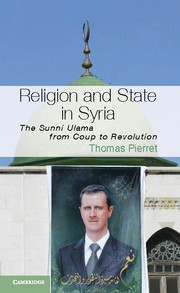Book contents
- Frontmatter
- Contents
- Acknowledgements
- A Note on Conventions
- Introduction
- Prologue
- 1 The Era of the ‘Founding Sheikhs’ (1920–1979)
- 2 Landscapes after the Battle (1979–2007)
- 3 (Re)defining Orthodoxy against Reformist Trends
- 4 The Turban and the Chequebook
- 5 Ulama and Islamists in the Political Field
- 6 Reforms and Revolution
- Conclusion
- Bibliography
- Index
4 - The Turban and the Chequebook
Political Economy of the Syrian Religious Elite
Published online by Cambridge University Press: 05 February 2013
- Frontmatter
- Contents
- Acknowledgements
- A Note on Conventions
- Introduction
- Prologue
- 1 The Era of the ‘Founding Sheikhs’ (1920–1979)
- 2 Landscapes after the Battle (1979–2007)
- 3 (Re)defining Orthodoxy against Reformist Trends
- 4 The Turban and the Chequebook
- 5 Ulama and Islamists in the Political Field
- 6 Reforms and Revolution
- Conclusion
- Bibliography
- Index
Summary
The two main values of Damascene society are: to have money, and to have a sheikh.
A Syrian merchant, Damascus, 2007We have already met Na‘im al-‘Arqsusi, one of the most popular sheikhs in Damascus despite his relative youth (in the first decade of the new millennium he was still only in his fifties). Due to his popularity, his daily schedule resembles that of a high-ranking state official: he spends much of the day in his office receiving a stream of individuals come to submit various requests. These are sometimes about arbitration of family or business conflicts, a traditional prerogative of clerics, and sometimes about making up for the (formerly) state-run banking system which many Syrians are reluctant to use. A newlywed tells how he turned to al-‘Arqsusi in order to obtain a loan to buy a house. The sheikh then contacted his merchant supporters and vouched for the applicant.
While such transactions usually take place in relative secrecy, there are occasions when al-‘Arqsusi’s qualities of broker between the rich and the needy are displayed openly. During the celebration of the Mawlid, for example, he has organised ‘auctions’ whose profits are donated to a charitable project called Sunduq al-Mawadda wa-l-Rahma (Fund of love and mercy), which aims to help young people get married by helping to pay the dowry. Responding to the exhortations of the scholar, the faithful raise their hands and indicate with their fingers the number of marriage grants with a value of 50,000 Syrian pounds (about US$1,000) they are willing to pay for. In 2007, 7.5 million pounds were collected in one evening.
- Type
- Chapter
- Information
- Religion and State in SyriaThe Sunni Ulama from Coup to Revolution, pp. 144 - 162Publisher: Cambridge University PressPrint publication year: 2013



